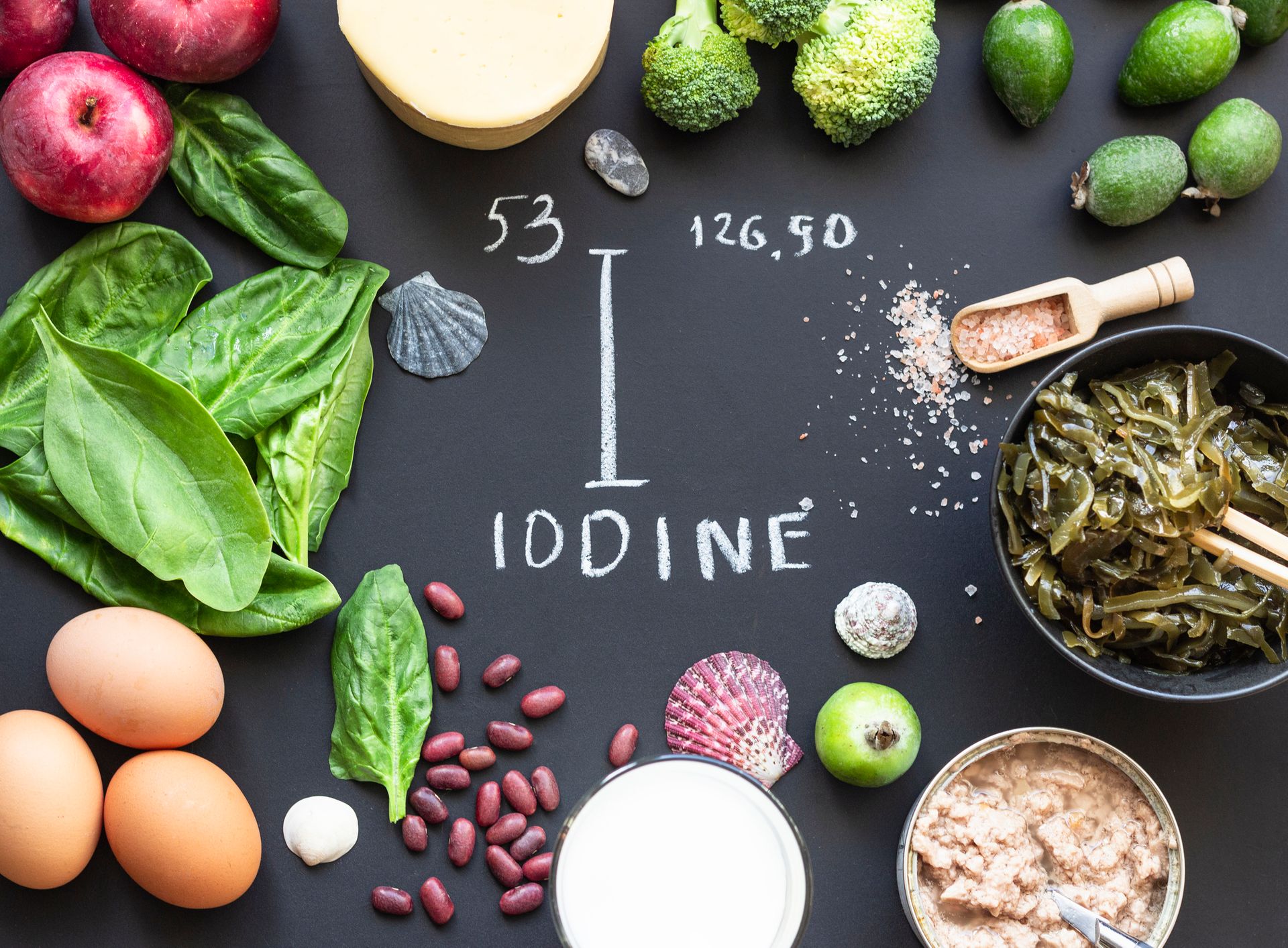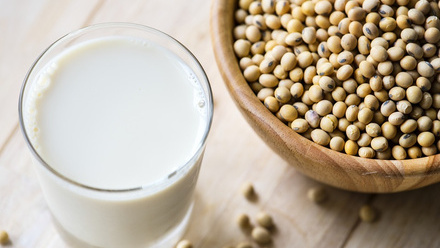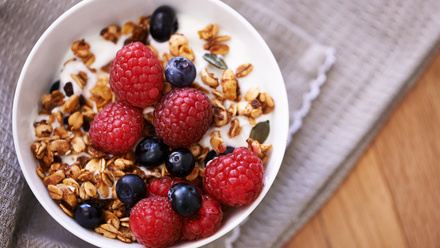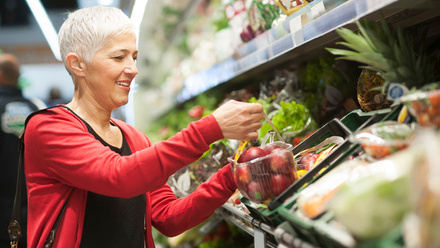This Food Fact Sheet is all about the nutrient iodine. It explains why iodine is important, how much iodine you need for health and the main food sources of iodine.
What is iodine and how does it help the body?

Iodine is a mineral that is important for health and comes from the diet. It is a key part of the thyroid hormones needed for many body processes including growth, metabolism and for the development of a baby’s brain during pregnancy and early life.
What happens if my intake of iodine is not enough?
A low intake of iodine over a long period of time will cause the thyroid gland to work harder to try to keep the right amount of thyroid hormones in the blood. Whilst rare in the UK, the thyroid may increase in size in order to trap iodine – this swelling, or “goitre”, may be visible in the neck.
Low intake of iodine during pregnancy may affect development of the baby’s brain. This could have consequences in later life such as lower IQ or reduced reading ability.
It is important to think about diet and nutrition to meet the recommended intake of iodine and reduce risk of deficiency.
How much iodine is needed?
|
|
Iodine recommended per day (mcg)* |
|
Adults |
150 |
|
In pregnancy |
200 |
|
When breastfeeding |
200 |
*European Food Safety Authority (EFSA) recommendations
Before and during pregnancy and breastfeeding
You need iodine from the very early stages of pregnancy. Having enough iodine in the diet for several months before pregnancy is very important. Your body is able to build up good stores of iodine in the thyroid, which can help it to function well during pregnancy, particularly in the early stages. So, it is crucial that if you are of childbearing age, especially when planning a pregnancy, you should meet the adult recommendation for iodine intake.
During pregnancy, the amount of iodine you need increases. This is in order to make enough thyroid hormones to transfer to the baby, to help the brain develop correctly. Iodine deficiency in pregnancy may have significant consequences for brain development, so it is vital to meet the higher recommendation for iodine during that time.
It is also important to ensure that intake of iodine is adequate whilst breastfeeding, so that breast milk contains enough iodine for the baby at a time when the brain is still developing.
Where is iodine found in the diet?
Iodine is found in a range of foods, the richest sources being fish, milk and dairy products. In general, white fish contains more iodine than oily fish.
Milk and dairy products are the main sources of iodine for most people in the UK. Some milk-alternative drinks (e.g. soya/oat) are now being fortified with iodine, but it is important to check the product label, as not all are fortified and some have low iodine content.
In many countries, iodine is added to table salt to give “iodised salt”. Iodised salt is not widely available in the UK but can be found in some branches of several supermarket chains. As government recommendations are to reduce salt intake for health reasons, iodised table salt should not be relied on as a means of increasing iodine intake.
Seaweed has a high concentration of iodine, but it contains variable amounts and intake can lead to excessive iodine. Brown seaweeds (such as kelp) in particular have a very high iodine content. Therefore, it is not recommended to eat brown seaweed or kelp more than once a week, especially during pregnancy. Other seaweeds, such as nori, may have a lower iodine concentration than kelp, but the iodine content varies considerably. Seaweed is therefore not a reliable source of iodine and is not recommended as a means of ensuring adequate iodine intake.
It is very difficult to estimate the amount of iodine in food. This is because the actual amount of iodine in food varies for several reasons, including iodine content in the soil, farming practices, the season and type of fish. The figures in the table are therefore for guidance only. And, remember to follow government advice on foods to avoid during pregnancy.
|
Food |
Portion |
Average iodine/portion (mcg) |
|
Milk and dairy products |
||
|
Cow's milk |
200ml |
50-100** |
|
Yoghurt |
150g |
50-100** |
|
Cheese |
40g |
15 |
|
Fish |
||
|
Haddock |
120g |
390 |
|
Cod |
120g |
230 |
|
Plaice |
130g |
30 |
|
Salmon fillet |
100g |
14 |
|
Canned tuna |
100g |
12 |
|
Shellfish |
||
|
Prawns |
60g |
6 |
|
Scampi |
170g |
160 |
|
Other |
||
|
Eggs |
1 egg (50g) |
25 |
|
Meat/poultry |
100g |
10 |
|
Nuts |
25g |
5 |
|
Bread |
1 slice (36g) |
5 |
|
Fruit and vegetables |
1 portion (80g) |
3 |
**Depending on the season, higher value in winter
Is it possible to have too much iodine?
Yes – excessive iodine intake can cause thyroid problems and should be avoided. Kelp and seaweed are food sources that are likely to lead to excessive iodine intake. It is difficult to say how much is too much, as this varies between people. If you have thyroid disease or are already iodine deficient, an iodine intake that would be considered normal for the general population may affect you. However, as a rough guide, intake in adults should not exceed 600 mcg/day.
Who is at risk of iodine deficiency?
Anyone who avoids fish and/or dairy products (e.g. due to allergy or intolerance) could be at risk of iodine deficiency. Therefore, vegetarians and particularly vegans, are at risk of iodine deficiency. As there are few plant-based sources of iodine, it may be necessary to consider a suitable iodine-containing supplement (see below).
A dietitian is qualified to assess diet and risk of deficiency, consider seeing a dietitian for practical advice to improve iodine intake if you are concerned.
What about an iodine supplement?
There are currently no official recommendations for people in the UK to take an iodine supplement. It is better to meet iodine recommendations through diet where possible. Most adults following a healthy, balanced diet that contains milk, dairy products and fish, should be able to meet their iodine requirements. If you do not consume sufficient iodine-rich foods, a supplement containing iodine may be useful.
If there is adequate intake before and during pregnancy, an iodine supplement may not be needed. Many, but not all, pregnancy multivitamin and mineral supplements contain iodine. If the supplement does contain iodine, check that it does not provide more than 150 mcg – the rest of the requirement for pregnancy should be met by the diet.
The following information may be helpful if choosing an iodine supplement:
- If you have thyroid disease or low iodine intake over many years, check with your GP before taking additional iodine
- Iodine in supplements should be in the form of “potassium iodide” or “potassium iodate” and should not exceed the daily adult requirement of 150 mcg
- Seaweed or kelp supplements should not be used as an iodine source. The amount of iodine in such supplements can vary considerably from the value claimed on the label and can provide excessive quantities of iodine
Top tips
- Avoid having too little or too much iodine
- If you may become pregnant or are planning a pregnancy, you should meet the recommended intake of iodine before pregnancy to ensure that iodine stores are optimised
- Having enough iodine during pregnancy is important as iodine is crucial for the development of the baby’s brain
- Good dietary sources of iodine include milk and dairy products, fish, shellfish and eggs
- If choosing a plant-based milk alternative drink (e.g. soya/oat) choose a product that is fortified with iodine
- If following a vegetarian or vegan diet with very few rich sources of iodine, consider a suitable iodine-containing supplement
- Do not use kelp supplements as a source of iodine
- Consider seeing a dietitian if you are concerned about meeting iodine recommendations through diet
This resource has been produced by the BDA in partnership with Dietitians Dr. Sarah Bath and Claire Pettitt.
Source(s)
- Aakre, I., D. D. Solli, M. W. Markhus, H. K. Mæhre, L. Dahl, S. Henjum, J. Alexander, P. A. Korneliussen, L. Madsen and M. Kjellevold (2021). "Commercially available kelp and seaweed products - valuable iodine source or risk of excess intake?" Food Nutr Res 65.
- Abel, M. H., I. H. Caspersen, H. M. Meltzer, M. Haugen, R. E. Brandlistuen, H. Aase, J. Alexander, L. E. Torheim and A. L. Brantsaeter (2017). "Suboptimal Maternal Iodine Intake Is Associated with Impaired Child Neurodevelopment at 3 Years of Age in the Norwegian Mother and Child Cohort Study." J Nutr 147: 1314-1324.
- Bath, S. C. (2019). "The effect of iodine deficiency during pregnancy on child development." Proc Nutr Soc 78(2): 150-160.
- Bath, S. C., S. Button and M. P. Rayman (2014). "Availability of iodised table salt in the UK – is it likely to influence population iodine intake?" Public Health Nutr 17(2): 450-454.
- Bath, S. C., S. Hill, H. G. Infante, S. Elghul, C. J. Nezianya and M. P. Rayman (2017). "Iodine concentration of milk-alternative drinks available in the UK in comparison with cows' milk." Br J Nutr 118(7): 525-532.
- Bath, S. C., C. D. Steer, J. Golding, P. Emmett and M. P. Rayman (2013). "Effect of inadequate iodine status in UK pregnant women on cognitive outcomes in their children: results from the Avon Longitudinal Study of Parents and Children (ALSPAC)." Lancet 382(9889): 331-337.
- Bath, S. C., J. Verkaik-Kloosterman, M. Sabatier, S. Ter Borg, A. Eilander, K. Hora, B. Aksoy, N. Hristozova, L. van Lieshout, H. Tanju Besler and J. H. Lazarus (2022). "A systematic review of iodine intake in children, adults, and pregnant women in Europe-comparison against dietary recommendations and evaluation of dietary iodine sources." Nutr Rev.
- Bath, S. C., A. Walter, A. Taylor, J. Wright and M. P. Rayman (2014). "Iodine deficiency in pregnant women living in the South East of the UK: the influence of diet and nutritional supplements on iodine status." Br J Nutr 111(9): 1622-1631.
- Bouga, M. and E. Combet (2015). "Emergence of seaweed and seaweed-containing foods in the UK: focus on labeling, iodine content, toxicity and nutrition." Foods 4(2): 240-253.
- Burgi, H. (2010). "Iodine excess." Best Pract Res Clin Endocrinol Metab 24(1): 107-115.
- Crawford, B. A., C. T. Cowell, P. J. Emder, D. L. Learoyd, E. L. Chua, J. Sinn and M. M. Jack (2010). "Iodine toxicity from soy milk and seaweed ingestion is associated with serious thyroid dysfunction." Med J Aust 193(7): 413-415.
- Dineva, M., H. Fishpool, M. P. Rayman, J. Mendis and S. C. Bath (2020). "Systematic review and meta-analysis of the effects of iodine supplementation on thyroid function and child neurodevelopment in mildly-to-moderately iodine-deficient pregnant women." Am J Clin Nutr 112(2): 389-412.
- European Food Safety Authority (2014). "Scientific Opinion on Dietary Reference Values for iodine." EFSA Journal 12(5): 3660.
- Eveleigh, E., L. Coneyworth, M. Zhou, H. Burdett, J. Malla, V. H. Nguyen and S. Welham (2022). "Vegans and vegetarians living in Nottingham (UK) continue to be at risk of iodine deficiency." Br J Nutr: 1-46.
- Eveleigh, E. R., L. J. Coneyworth, A. Avery and S. J. M. Welham (2020). "Vegans, Vegetarians, and Omnivores: How Does Dietary Choice Influence Iodine Intake? A Systematic Review." Nutrients 12(6).
- Food Standards Agency (2008). Retail Survey of Iodine in UK produced dairy foods. FSIS 02/08. Available at: http://tna.europarchive.org/20140306205048/http://www.food.gov.uk/science/research/surveillance/fsisbranch2008/fsis0208 (Accessed: 29 April 2015).
- Food Standards Australia New Zealand (FSANZ) (2011). Advice on brown seaweed for pregnant women; breastfeeding women and children. June 2011. Available at: http://www.foodstandards.gov.au/consumer/safety/brownseaweed/Pages/default.aspx (accessed 11 November 2013).
- Hynes, K. L., P. Otahal, J. R. Burgess, W. H. Oddy and I. Hay (2017). "Reduced Educational Outcomes Persist into Adolescence Following Mild Iodine Deficiency in Utero, Despite Adequacy in Childhood: 15-Year Follow-Up of the Gestational Iodine Cohort Investigating Auditory Processing Speed and Working Memory." Nutrients 9(12): pii: E1354. doi: 1310.3390/nu9121354.
- Lee, S. M., J. Lewis, D. H. Buss, G. D. Holcombe and P. R. Lawrance (1994). "Iodine in British foods and diets." Br J Nutr 72(3): 435-446.
- Leung, A. M., E. N. Pearce and L. E. Braverman (2009). "Iodine content of prenatal multivitamins in the United States." N Engl J Med 360(9): 939-940.
- Levie, D., T. I. M. Korevaar, S. C. Bath, M. Murcia, M. Dineva, S. Llop, M. Espada, A. E. van Herwaarden, Y. B. de Rijke, J. M. Ibarluzea, J. Sunyer, H. Tiemeier, M. P. Rayman, M. Guxens and R. P. Peeters (2019). "Association of maternal iodine status with child IQ: a meta-analysis of individual-participant data." J Clin Endocrinol Metab 104(12): 5957-5967.
- Moleti, M., B. Di Bella, G. Giorgianni, A. Mancuso, A. De Vivo, A. Alibrandi, F. Trimarchi and F. Vermiglio (2011). "Maternal thyroid function in different conditions of iodine nutrition in pregnant women exposed to mild-moderate iodine deficiency: an observational study." Clin Endocrinol (Oxf) 74(6): 762-768.
- Nicol, K., E. L. Thomas, A. P. Nugent, J. V. Woodside, K. H. Hart and S. C. Bath (2022). "Iodine fortification of plant-based dairy and fish alternatives: the effect of substitution on iodine intake based on a market survey in the UK." Br J Nutr: 1-11.
- Public Health England (2019). Composition of foods integrated dataset (CoFID) 2019. Available at: https://www.gov.uk/government/publications/composition-of-foods-integrated-dataset-cofid (accessed 21 October 2020).
- Public Health England (2020). National Diet and Nutrition Survey (NDNS): Results from years 9 to 11 of the Rolling Programme (2016 to 2017 and 2018 to 2019). Available at: https://www.gov.uk/government/statistics/ndns-results-from-years-9-to-11-2016-to-2017-and-2018-to-2019 (accessed 18 January 2021).
- Rebagliato, M., M. Murcia, M. Espada, M. Alvarez-Pedrerol, F. Bolumar, J. Vioque, M. Basterrechea, E. Blarduni, R. Ramon, M. Guxens, C. M. Foradada, F. Ballester, J. Ibarluzea and J. Sunyer (2010). "Iodine intake and maternal thyroid function during pregnancy." Epidemiology 21(1): 62-69.
- Stevenson, M. C., C. Drake and D. I. Givens (2018). "Further studies on the iodine concentration of conventional, organic and UHT semi-skimmed milk at retail in the UK." Food Chem 239: 551-555.
- Zimmermann, M. and F. Delange (2004). "Iodine supplementation of pregnant women in Europe: a review and recommendations." Eur J Clin Nutr 58(7): 979-984.
- Zimmermann, M. B. (2009). "Iodine deficiency." Endocr Rev 30(4): 376-408.
- Zimmermann, M. B. and M. Andersson (2021). "GLOBAL ENDOCRINOLOGY: Global perspectives in endocrinology: coverage of iodized salt programs and iodine status in 2020." Eur J Endocrinol 185(1): R13-r21.







